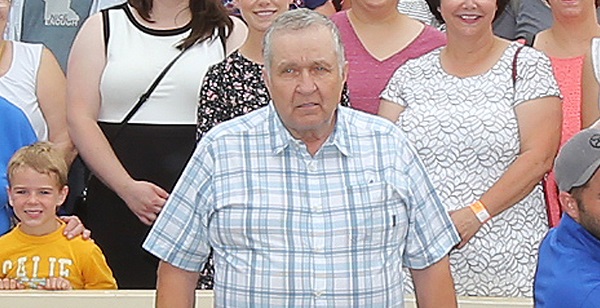BY JIM WELLS
One of his trainers sizes it up simply as a numbers game. Or in metaphorical terms, if you shoot a lot of bullets you’re apt to hit the bulls-eye sometimes.
There is more to the analysis than that, however, because Thomas J. Scheckel has been a horseman for as long as he can remember, since he was five years old when he climbed into the saddle for the first time. He owns horses, shows horses, buys and sells horses and, in the latest of his equine endeavors, he races horses.
And he’s proven pretty darn good at it, although, yes, in his bid for the winners’ circle, he empties the corral at Canterbury Park, where he shared the quarter horse owners’ title last year with Dean Frey and is positioned to make a solo claim on it this season.
Scheckel has shown horses for years, but has been racing them a half dozen years, or maybe less, and he has taken a different approach to the game than many owners.
For example:
He uses several trainers at Canterbury Park: Jason Olmstead, Manny Campos, Bill Harris and Shawna Manriquez.
Why so many?
“I don’t like to put my eggs all in one basket,” Scheckel explained. “You never know, something could happen to a trainer; he could get ruled off for something.”
The quarter horse season (except for the Festival of Champions card) ends next weekend, and Scheckel is in solid position to win it alone.
At the conclusion of the race week Saturday, his stable is 7-2-4 from 46 starts with earnings of $83,042. In second place is Milena Kwiecien, 4-0-2 from 13 starts, with $40,460 in earnings. Tom Pouliot is 3-1-0 from four starts with earnings of $78, 788. The difference in starts among the three leaders is appreciable, but Scheckel likes doing things in a big way.
Asked if his farm has a name, this native of Bellevue, Iowa, put the question to rest by pointing out that he owns some 19 farms, most of them in the state of Iowa, and owns some 100 horses of various breeds and descriptions.
“I’m horse poor,” he said. “I have reining horses, cutters, draft horses and we’re still showing halter horses. We raise, buy and sell horses.”
It runs in the family.
“My dad was in the business, my brothers are all in the horse business. I’ve been at it about 60 years, since I got a little white Welsh pony when I was five years old.”
Scheckel’s foray into the racing end of the equine world included thoroughbreds but is limited exclusively to quarter horses now.
“I had five thoroughbreds for a couple of years,” he explained, “but they were losing me money. Quarter horses have more residual value at the end of their racing. You can sell them to the rodeo crowd. Unless you have a thoroughbred that can become a jumper there’s not much use for him.”
Scheckel won the owner’s title twice in his home state, at Prairie Meadows, and has all but wrapped up a second one in his neighboring state to the north. “I don’t foresee anyone catching him,” said Olmstead “We’ve got a few more bullets in the gun.”
Scheckel’s wins in Shakopee include two stakes, the Gopher State Derby last year with La Mos Pyc and the Dash in a Flash with Divas Candy Girl in 2016. And another owner’s title appears to be forthcoming.
His knowledge of the industry would seem to bode well for his financial goals. Sheckel is someone who should know how to make a shekel in a tough business.
He knows the realities. Asked what it takes to become a millionaire in the the horse racing business, Scheckel’s answer is always the same. “Well,” he says, “you have to start with two million.”
